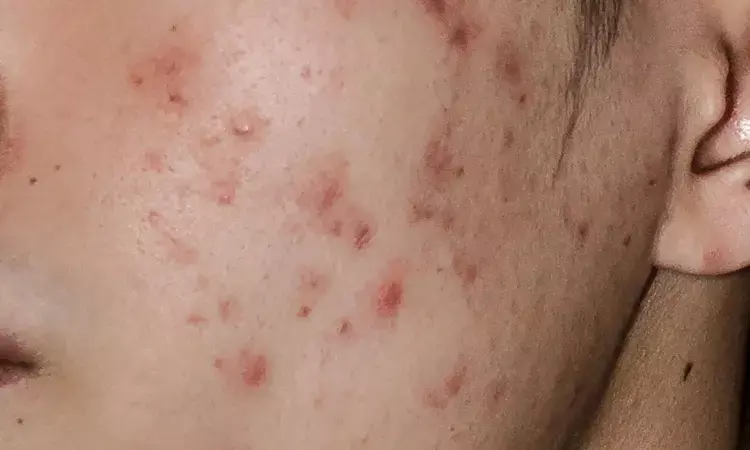- Home
- Medical news & Guidelines
- Anesthesiology
- Cardiology and CTVS
- Critical Care
- Dentistry
- Dermatology
- Diabetes and Endocrinology
- ENT
- Gastroenterology
- Medicine
- Nephrology
- Neurology
- Obstretics-Gynaecology
- Oncology
- Ophthalmology
- Orthopaedics
- Pediatrics-Neonatology
- Psychiatry
- Pulmonology
- Radiology
- Surgery
- Urology
- Laboratory Medicine
- Diet
- Nursing
- Paramedical
- Physiotherapy
- Health news
- Fact Check
- Bone Health Fact Check
- Brain Health Fact Check
- Cancer Related Fact Check
- Child Care Fact Check
- Dental and oral health fact check
- Diabetes and metabolic health fact check
- Diet and Nutrition Fact Check
- Eye and ENT Care Fact Check
- Fitness fact check
- Gut health fact check
- Heart health fact check
- Kidney health fact check
- Medical education fact check
- Men's health fact check
- Respiratory fact check
- Skin and hair care fact check
- Vaccine and Immunization fact check
- Women's health fact check
- AYUSH
- State News
- Andaman and Nicobar Islands
- Andhra Pradesh
- Arunachal Pradesh
- Assam
- Bihar
- Chandigarh
- Chattisgarh
- Dadra and Nagar Haveli
- Daman and Diu
- Delhi
- Goa
- Gujarat
- Haryana
- Himachal Pradesh
- Jammu & Kashmir
- Jharkhand
- Karnataka
- Kerala
- Ladakh
- Lakshadweep
- Madhya Pradesh
- Maharashtra
- Manipur
- Meghalaya
- Mizoram
- Nagaland
- Odisha
- Puducherry
- Punjab
- Rajasthan
- Sikkim
- Tamil Nadu
- Telangana
- Tripura
- Uttar Pradesh
- Uttrakhand
- West Bengal
- Medical Education
- Industry
Which is most effective most effective treatment for acne?

Acne is a common skin disease with an estimated global presence of 9.4% and an annual cost of $3 billion in the United States.
Researchers have found in a new meta-analysis that oral isotretinoin was the most effective treatment for acne. The findings of the study have been published in The Annals of Family Medicine.
In their comprehensive meta-analysis (comprising 221 randomized controlled trials involving 65,601 patients), researchers investigated the effectiveness of various pharmacological therapies for acne vulgaris across diverse age groups and genders. The articles described 37 interventions, with a median patient age of 20 years old and median duration of treatment of 12 weeks. The median total, inflammatory and non-inflammatory lesion counts were 71.5, 27 and 44, respectively.
The study revealed that oral isotretinoin was the most effective treatment (mean difference 48.41; p-score 1.00), followed in efficacy by a triple therapy containing a topical antibiotic, a topical retinoid and benzoyl peroxide (BPO) (MD 38.15; p-score 0.95) and another triple therapy containing an oral antibiotic, a topical retinoid and BPO (MD 34.83; p-score 0.90). For monotherapies besides isotretinoin, antibiotics or topical retinoids have comparable efficacy for inflammatory lesions, while antibiotics have less effect on non-inflammatory lesions. Additionally, the authors present a comprehensive comparison of each intervention, providing a valuable resource for clinical decision-making.
What We Know: Although guidelines that recommend medications are generally supported by high-quality, randomized controlled trials, research is lacking on the efficacy of certain medications, particularly when comparing treatment options that have markedly inconsistent drug prescribing patterns among countries and among prescriber specialties.
What This Study Adds: Based on a comprehensive meta-analysis of 210 articles, comprising 221 trials and examining 37 interventions involving 65,601 patients, researchers have concluded that oral isotretinoin is the most effective treatment for acne. Following closely behind, triple therapies incorporating a topical retinoid, benzoyl peroxide (BPO) and an antibiotic have shown significant efficacy. For monotherapies, both oral/topical antibiotics and topical retinoids demonstrate comparable effectiveness for inflammatory lesions. However, it is important to note that oral/topical antibiotics exhibit limited efficacy for non-inflammatory lesions and should not be utilized as stand-alone treatments due to the risk of bacterial resistance.
Reference:
Chung-Yen Huang, I-Jing Chang, Nicole Bolick, Wan-Ting Hsu, Chin-Hua Su, Tyng-Shiuan Hsieh, I-Hsuan Huang and Chien-Chang Lee, Comparative Efficacy of Pharmacological Treatments for Acne Vulgaris: A Network Meta-Analysis of 221 Randomized Controlled Trials, The Annals of Family Medicine July 2023, 21 (4) 358-369; DOI: https://doi.org/10.1370/afm.2995.
Dr Kamal Kant Kohli-MBBS, DTCD- a chest specialist with more than 30 years of practice and a flair for writing clinical articles, Dr Kamal Kant Kohli joined Medical Dialogues as a Chief Editor of Medical News. Besides writing articles, as an editor, he proofreads and verifies all the medical content published on Medical Dialogues including those coming from journals, studies,medical conferences,guidelines etc. Email: drkohli@medicaldialogues.in. Contact no. 011-43720751


